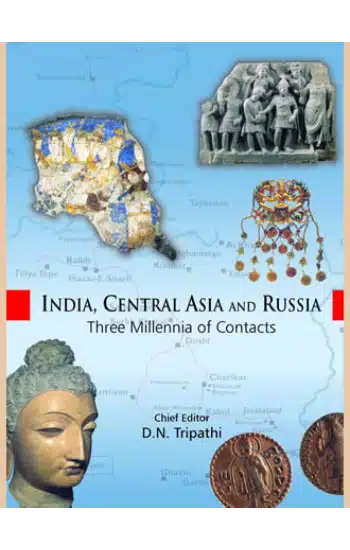
Save: 15%

Save: 15%
India, Central Asia And Russia: Three Millennia Of Contacts
Publisher:
| Author:
| Language:
| Format:
Publisher:
Author:
Language:
Format:
₹1,500 ₹1,275
Save: 15%
In stock
Ships within:
In stock
| Book Type |
|---|
ISBN:
Page Extent:
India and Central Asia had close contacts in various fields of human activities from the earliest times. Archaeological excavations of stone and bronze cultures in Central Asia have brought to light a similarity with cultures existing in northwest India of the same time. There are striking similarities between the finds from Altyntepe in southern Turkmenistan and the relics of Harappan Culture in northwest India. More concrete historical evidence can he found during Kushana period. These relations became closer in the medieval times because the founders of the Delhi Sultanate and the Mughal Empire in the 13th and 16th centuries respectively hailed from Central Asian lands. Along with conquerors and founders of the ruling dynasties came the scholars, poets, scientists and Sufi saints. Religious influence spreading from one direction to the other set in motion a process of reciprocal cultural enrichment. There was also unhindered overland trade carried by merchant caravans. Like Indo-Central Asian relations, Indo-Russian relations also go back to remote past. There have been deep and abiding links because of geopolitical and strategic considerations. However, Central Asia has been continuously a vital link in relations between India and Russia. The present volume aims to trace these contacts and gives an overview of the origin, historical development, present state of relationship and future challenges. India, Central Asia, and Russia represent a certain harmony of originally distant and distinct cultures and civilizations finding a certain post-ideological affinity based on geography, historical links and common technological and economic challenges. The core of this conceptual agreement and its policy consequences is in pluralism, secularism, multi-ethnicity and cultural synthesis.
India and Central Asia had close contacts in various fields of human activities from the earliest times. Archaeological excavations of stone and bronze cultures in Central Asia have brought to light a similarity with cultures existing in northwest India of the same time. There are striking similarities between the finds from Altyntepe in southern Turkmenistan and the relics of Harappan Culture in northwest India. More concrete historical evidence can he found during Kushana period. These relations became closer in the medieval times because the founders of the Delhi Sultanate and the Mughal Empire in the 13th and 16th centuries respectively hailed from Central Asian lands. Along with conquerors and founders of the ruling dynasties came the scholars, poets, scientists and Sufi saints. Religious influence spreading from one direction to the other set in motion a process of reciprocal cultural enrichment. There was also unhindered overland trade carried by merchant caravans. Like Indo-Central Asian relations, Indo-Russian relations also go back to remote past. There have been deep and abiding links because of geopolitical and strategic considerations. However, Central Asia has been continuously a vital link in relations between India and Russia. The present volume aims to trace these contacts and gives an overview of the origin, historical development, present state of relationship and future challenges. India, Central Asia, and Russia represent a certain harmony of originally distant and distinct cultures and civilizations finding a certain post-ideological affinity based on geography, historical links and common technological and economic challenges. The core of this conceptual agreement and its policy consequences is in pluralism, secularism, multi-ethnicity and cultural synthesis.
About Author
Reviews
There are no reviews yet.
Related products
The Sacred Landscape Of Mundeshwari: The ‘Oldest Living’ Temple
Save: 15%
Harappan Studies: Recent Researches In South Asian Archaeology (Vol. Ii)
Save: 15%
RELATED PRODUCTS
Burhanpur: Unexplored History, Monuments And Society
Save: 15%
Early History Of Varanasi: Recent Excavations At Rajghat
Save: 15%
Glory Of The Kushans: Recent Discoveries And Interpretations
Save: 15%
Maritime Trade And Overseas Activities Of Early India: Odishan Perspective
Save: 15%
Ornamentation In Indian Architecture: Oriental Motifs And Designs
Save: 15%
Royal Messages By The Wayside: Historical Geography Of The Asokan Edicts
Save: 15%
The Dussehra Of Kulu: History And Analysis Of A Cultural Phenomenon
Save: 15%
The Sacred Landscape Of Mundeshwari: The ‘Oldest Living’ Temple
Save: 15%
Women And Gender In Ancient Inida: A Study Of Texts And Inscriptions
Save: 15%



Reviews
There are no reviews yet.